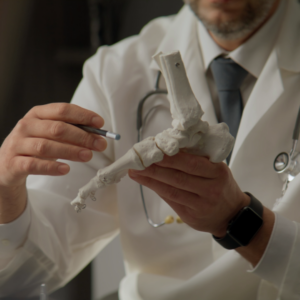by Scott Rayment.
Being a Podiatrist in a Sports Medicine clinic requires experience in the ways the foot and ankle is managed, including what happens during surgery. After attending surgeries and spending time with half a dozen foot and ankle surgeons I will shed some light on what foot & ankle surgeries can involve.
Part of our job in the process is to understand when a recommendation for referral is needed and why. This can be critical to positive patient outcomes. Reflecting on this, I decided to make an active effort to observe Orthopaedic Surgeons specialising in foot and ankle surgery this year.
My Observations
I would like to say a special thanks to the following surgeons for allowing me to observe them in theatre and providing me with the opportunity:
- Daniel Goldbloom
- Otis Wang
- Janan Chandrananth
- Keith Winters
- Harvinder Bedi
- Geoffry Tymms
Observations involved being in the theatre with the surgeons and their team during several foot and ankle operations. This allowed me to view a wide range of surgical procedures, techniques, imaging (eg. X-Ray), casting, injections and more.
 5 things to expect during surgery:
5 things to expect during surgery:
- The surgeon, anaesthetist, and assisting doctor always meet with you prior to surgery to explain what will happen.
- When brought into the theatre you are greeted by the welcoming nurses who check off your details and have a nice chat to calm any nerves.
- After the anaesthetic is administered the Anaesthetist remains in the room monitoring your vitals for the entire
- There are lots of people in the room who check on equipment, the procedure and ensure you are in a comfortable position at all times.
- The surgeon will meet with you after the surgery when you wake to provide a summary on how it went.
Throughout the process all surgeons were very informative. They would explain their procedures thoroughly, exemplifying why they are the best people for this job. I viewed surgeries for a range of concerns including:
- Bunions
- Osteoarthritis
- Claw Toes
- Ankle sprains
- Syndesmosis
- Neuroma
- Flat foot correction
- Coalitions
- Achilles & Tendons
- and Stress Fractures
Common questions
Some common questions I get asked when in clinic are below. After witnessing multiple surgeries, I thought I would give some general answers to them here.
How do I know if I need surgery?
This is very case dependent; it would be best to seek advice from your GP or Podiatrist as they would be familiar with your circumstances. You can get an opinion from one or multiple surgeons, and this does not guarantee you will need surgery.
Will I be off my feet for long?
Time off your feet can range from 4 to more weeks, which can be the reality of surgery. BUT, for example, new advances in bunion surgery, can have you walking on the same day.
Should I be worried or scared?
In the operating rooms there are 5+ trained medical professionals whose sole purpose is looking after you and getting the best outcomes. It’s understandable to have doubts, but these hospitals go to extreme lengths to ensure your safety is a priority.
My Comments
These observations have provided me with invaluable knowledge that I can apply to my own understanding in the clinic. This can be done pre-surgery in the assessment of whether an injury or condition is past conservative treatment, or post-surgical management during rehabilitation and long-term considerations of altered foot mechanics.
I have learnt from the surgeons that they would rather you exhaust all your conservative measures first, as outlined above. Once exhausted, there is no harm in getting an opinion. Orthopaedic opinion can empower you with knowledge about your options for your problem. When it comes to the foot and ankle, seeing orthopaedic specialist in this field is preferable. Foot and ankle surgeries are full of nuance and are complex. Seeing a specialist could be the difference between an ok outcome and a great one.
